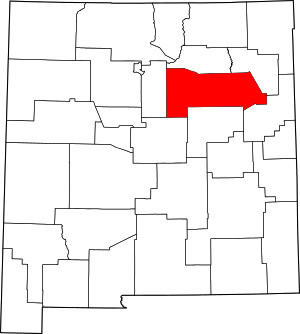Rociada, New Mexico
Rociada is a settled area in San Miguel County, New Mexico located 27 miles northwest of Las Vegas, the county seat. One of the valleys of the Sangre de Cristo Mountains with the Manuelitas Creek running through it, Rociada actually comprises two villages, Upper and Lower Rociada. Several nearby villages such as Pendaries and Gascon, although technically in Mora County also use the Rociada postal address. Rociada's name means "sprinkled with dew" in Spanish, reflecting its relatively mild moist climate in the summer compared to the other hot and arid areas of Northern New Mexico.[1][2]
Rociada, New Mexico | |
|---|---|
| Coordinates: 35.8550344°N 105.4269584°W | |
| Country | United States |
| State | New Mexico |
| County | San Miguel |
| Elevation | 7,500 ft (2,286 m) |
| Population (2010) | |
| • Total | 609 |
| Time zone | UTC-7 (Mountain (MST)) |
| • Summer (DST) | UTC-6 (MDT) |
| Zip code | 87742 |
| Area code(s) | 505 |
| GNIS 912004 | 912004 |
Notable residents
- Milnor Rudulph (1826-1887) died in Rociada where he lived in his later years and taught in the village school. He had been Speaker of the New Mexico Territory Legislature to which was elected in 1870 and led the inquest into the death of Billy the Kid in 1881.[3]
- Nepomuceno Segura (1855–?) lived in Rociada for part of his life. He was one of the delegates to the New Mexico Constitutional Convention of 1910 and had been the translator of the first statute laws of Colorado in 1876.[4]
- José Albino Baca (1876–1924), the 5th Lieutenant Governor of New Mexico and his wife Marguerite Pendaries Baca (1876–1971), the 6th Secretary of State of New Mexico had a large ranch in Rociada. Their daughter, Emilie, who grew up on the ranch, later married Patrick Tracy Lowell Putnam (1904-1953), an American anthropologist who spent twenty-five years living among the Mbuti pygmies in central Africa.[1][5] Another daughter, Consuelo, was the second wife of writer and anthropologist Oliver La Farge.
- Antonia Apodaca (1923–2020), a musician and songwriter known for her performances of the traditional Hispano folk music of New Mexico, was born and raised in Rociada.[6]
gollark: How did you work that out? Spending unreasonable amounts of effort to put it into a computery program?
gollark: How do you know? It might go to enjarred brain conventions.
gollark: It would still maybe be killed. It's not not mean to kill someone just because they won't feel pain.
gollark: That would be mean.
gollark: 1000V would be much rounder.
References
- Workers of the Federal Writers' Project in the State of New Mexico (1940). New Mexico, a Guide to the Colorful State, p. 378. Coronado Cuarto Centennial Commission
- Julyan, Robert (1996). The Place Names of New Mexico. University of New Mexico Press Press
- Keleher, William Aloysius (1957/2007). Violence in Lincoln County, 1869-1881, pp. 349–351. Sunstone Press (facsimile edition of the original published in 1957)
- C.S. Peterson (1912). Representative New Mexicans p. 271
- Mark, Joan (1998). The King of the World in the Land of the Pygmies, p. 87. University of Nebraska Press
- Carlin, Bob (ed.) (2002). American Musical Traditions: Latino and Asian American music, p. 53. Schirmer Reference. ISBN 0028655885. Quote: "This brings up the importance of Cleofes Ortiz and Antonia Apodaca. They both grew up playing and learning the music and dances from the older generation and continued to play them. [...] Antonia Apodaca was born in 1923 in Rociada, New Mexico, in the house in which she lives to this day."
This article is issued from Wikipedia. The text is licensed under Creative Commons - Attribution - Sharealike. Additional terms may apply for the media files.

